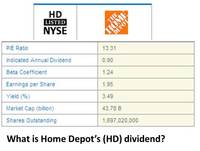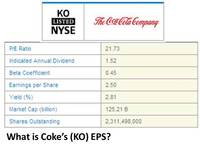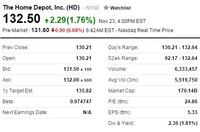STOCK MARKET PART 7
Stock Market Test
40 Questions
NAME :
DATE :
1. What are the two general types of stocks? CHOOSE TWO
A Deferred B Common
C Preferred D Certificate of Deposit
2. An index that measures the average health of 30 large, publicly owned, US companies is called the...?
A Guess Again Index B The S&P 500
C Bob Johnson's Index D Dow Jones Industrial Average (DJIA)
3. Which of the following best describes diversification?
A putting all your investments in two
financial investments
B reducing risk by investing in different
types of securities
C investing in different types of bonds
D Avoiding risk by investing in blue-chip
stocks
4. Not all companies offer dividends.
A false B true
5. The two major stock exchanges are
A Dow Jones Industrial Average & S&P 500 B NASDAQ & DJIA
C NASDAQ & NYSE D NYSE & American
6.
What is a stock market crash?
A when one or two stocks drop signifiicantly B rapid but anticipated drop in stock prices
C rapid and unanticipated drop in stock
prices
D slow decrease in stock prices over a year
7. The DOW Jones Industrial Average is an index of 30 American companies. Why is the DOW Jones Industrial Average important?
A It provides a snapshot of how the stock
market and the US economy is doing.
B It tells Americans how many jobs are out
there.
C It tells Americans how much debt the
country is in.
D It helps economists predict when a stock
market crash will happen.
8. What is the stock market?
A
A type of bank that gives out loans to new
businesses.
B
A special type of grocery store that sells
stocks.
C
A type of farmers market where people
buy and sell food.
D
A place where parts of businesses are
bought and sold.
9. The group of stocks that you own is called a
A portfolio B commission
C dividend
10.
A sum of money paid to shareholders of a corporation out of its
earnings.
A index B invest
C dividend D profit
11. If a business wants to raise capital but not create debt, it can
A float a bond issue B issue common stock
C borrow money from a commercial bank D borrow money from the government
12. IPO stands for
A Itemized Public Organization B Initial Public Offering
C Imminent Profitable Option D Initial Primary Offering
13. The Dow Jones Industrial Average is an example of
A A Stock Market Performance Index B a Stock Market Exchange
C a Brokerage Firm D a Mutual Fund
14. A time when stock prices are RISING is called
A bull market B transaction
C bear market
15. The NYSE and NASDAQ are forms of ________________ where people trade stocks.
A businesses B mutual funds
C stock exchanges D large shopping centers
16.
A group of large companies that stockbrokers look at to gauge how
the market is doing as a whole.
A industry B shareholder
C portfolio D index
17. The current price of one share of stock is called
A Ask B Bid
C Last D Open
18. Which of the following is NOT a stock index?
A P/E RATIO B DOW JONES
C NASDAQ COMPOSITE D S & P 500
19. When the market takes a downhill turn and prices are decreasing
A Bear B No such term
C Bull D Bronco
20. Can interest rates affect the stock market?
A YES B NO
21. A corporation “goes public” when it ___________________.
A has a big party and invites all its investors. B gives out its first dividend.
C becomes an entity. D first issues stock to investors to buy.
22. As long as you are 18 years old and have some money, you can invest it in the stock market.
A True B False
23. The name for a part of a business that is bought and sold on the stock market is:
A Share B Part
C Stocker D Marker
24. Why would a company need to issue stock?
A To raise money. B To show customers that it's successful.
C To stop the government from regulating it. D To increase its' customer base.
25. How do you make money buying stocks?
A
You sell it for a higher price than you
bought it for.
B
If you hold on to it as long as possible it
will gain in value.
C
The DOW ratings determine which stocks
will pay out.
26. What does NASDAQ stand for?
A
National Application of Securities Dealers
Automatic Quotations
B
Nominal Association of Securities Dealers
Automatic Quotations
C
New Association of Securities Dealers
Automatic Quotations
D
National Association of Securities Dealers
Automatic Quotations
27. People who own stocks are guaranteed a return on the money they have invested in stocks.
A TRUE B FALSE
28. What is the name of the most well know stock exchange?
A The Louvre B The New York Stock Exchange (NYSE)
C The Boston Stock Exchange D The Imperial Stock Exchange
29.
The possibility of losing some or all of a particiular investment.
A profit B risk
C industry D index
30.
A stock market crash can be brought on by
A economic crisis B major catastrophic event
C collapse of a stock bubble D all of these
31. What is a bond?
A
an investment that cannot be traded
B
lending money to a company for a fixed
interest payment
C a building on wall street D a share of ownership in a company
32. Do more or fewer people invest in the stock market when interest rates go up?
A FEWER B MORE
33. A company owned by families or a small number of investors and do not issue stock to the
public.
A portfolio B industry
C private company D public company
34. Not having all your stocks in one industry (airlines, food, etc) is called
A Diversifying B Directing
C Trading D Portfolio
35. Explain what an IPO is.
A
It's when a company goes 'public' and
offers its stock for sale for the first time.
B
It's when a company buys back a lot of its
stock to gain control of the company.
C
It's when another company buys a lot of
stock in another company to take it over.
36. A Neon Oil Corporation tanker spilled oil in the ocean around Australia. As a result of this
accident, the share price of this stock is likely to
A
increase
B
not be affected and remain about the
same
C fluctuate D decrease
37. How does a bear stock market impact the U.S. economy?
A
Consumers will purchase more vacation
homes.
B
Americans will invest more money in the
stock market.
C
Americans will invest less money in the
stock market.
D
Consumers will purchase more large
appliances.
38. When you own stock in a company,
A you are part owner. B you are the CEO.
C
you are entitled to a dividend.
D
you are involved in day to day
management.
39. The number of shares that have been traded in the current or most recent trading session is
called
A Previous Close B Dividend
C
Last
Last
D
Volume
40. The highest price the stock has traded over the past year is called
A
Market Cap
Market Cap
B
Day High
C 52 Week High D Beta
Answer Key
1. 2. d 3. b 4. b
5. c 6. c 7. a 8. d
9. a 10. c 11. b 12. b
13. a 14. a 15. c 16. d
17. c 18. a 19. a 20. a
21. d 22. a 23. a 24. a
25. a 26. d 27. b 28. b
29. b 30. d 31. b 32. a
33. c 34. a 35. a 36. d
37. c 38. a 39. d 40. c
Introduction to the Stock Market
48 Questions
NAME :
DATE :
1. EPS x (times) Shares Outstanding = a company's total ________
A Profits B Sales
C Dividends D Market Capitalization
2. In a 2-for-1 stock split, the price of the stock is
A doubles B falling
C cut in half D not affected
3. What is a bond?
A a building on wall street
B lending money to a company for a fixed interest payment
C an investment that cannot be traded
D a share of ownership in a company
4. A dividend is a portion of the company's profits paid to its shareholders.
A True B False
5. What is an IPO?
A when a company first sells stock to the public
B a new Apple product
C when the company's shareholders have a meeting
D when the government creates shares on the stock exchange
6. For a company to exist for the long term what must it continue to do?
A Provide for customers B Produce a product or a service
C Make a profit D Help the economy to grow
7. interest calculated at regular intervals solely on principal
A Simple Interest B Compound Interest
8. What is a mutual fund?
A a fund that follows an index like a stock B a type of high interest bank account
C a pool of securities you can buy as an investment
D a fund used by companies to raise capital
9. The last closing price of a stock divided by the last 12 months earning per share is
A Dividend Yield B Debt to Asset Ratio
C Earnings /Share D P/E
10. The price paid for the first share of stock in a trading session is
A Last B Bid
C Open D Change
11. Mutual funds are:
A usually less risky than investing in a money market
B an investment that holds a wide range of different investment instruments, providing diversification
C guaranteed to increase in value
D an investment portfolio managed by the investor
12.
A $13.31 B $1.24
C $1.95 D $0.90
13. Which of the following is your right as a shareholder of common stock?
A the right to dividends if paid B the right to hire officers of the corporation
14. What are 2 ways you can make money in stock market
A Use all of your money to buy stocks
B Do research and invest in stocks that do well
C be aware somebody will make you do that D Buy what everyone else is buying
15. If a company issues dividends, preferred stock holders are paid the dividends first.
A True B False
16. Typically, stocks are a good invest for the average person over a long period of time.
A True B False
17. A _____ is a list of the securities, including stocks, mutual funds, and cash that you own.
A folder B notebook
C collection D Portfolio
18. What does EPS stand for?
A Earnings People's Share B Earnings Per Share
C Earnings Price Share D Earnings Profit Share
19. In short selling, you first ___ the stock.
A buy B split
C hold D sell
20. _____ stock is the name applied to the stock of large, well-known, well-established companies
with good reputations.
A Dip and chip B Paint chip
C Chocolate chip D Blue chip
21. What is a another word for earnings?
A Dividends B Profits
C Stocks D Shares
22. What is Capitol gain?
A The gain of money a Capitol city gets B Short selling
C The amount a company gets that year D The increase in the value of the stock
23. What is the goal of an investor?
A Buy low and sell high B Keep a stock for their entire life
C Open a new investment account D Help a company get bigger
24. What is the Bull market
A When the stock market trends downward B This is when the bull owns the market
C The place where you buy bulls for bull fights
D When the stock market trends upward
25. Publicly held corporations
A are listed first on the New York Stock Exchange
B guarantee a positive return to investors
C are not-for-profit organizations
D have shares of stock that are held by public (outside) investors
26. Why should an investor diversify?
A promises growth in your investments B lets customers spend more
C gives a company more options D spreads the risk taken by a shareholder
27. Dividends
A The money a company makes each year
B The part of the corporations profit paid to stockholders
C How much money the owner makes
D The answer could be any one of these have fun
28. What is the primary reason why companies issue stocks?
A To ensure a stable market B To raise extra money for the company
C To guarantee the success of a new product
D To provide for their employee's retirements
29.
A $ 0.62 B $ 2.50
C $ 1.95 D $ 0.55
30. What is Leverage?
A The average growth of a stock each year B A rise in the general level of prices
C Prying open a door with a crowbar
D The use of borrowed money to buy securities
31. What is a Bear Market?
A when the stock market trends upward B answer the question see if you are correct
C When the stock market trends Downward D A place where you sell bears downtown
32. Yield of the stock based on last price. Figured by dividing the yearly dividend by the last price.
A Change B Dividend
C Dividend Yield D Previous Close
33. What is Common Stock
A Stock that the common people buy B leaves of corn that look alike
C variable dividend but no voting rights
D A type of stock that pays a variable dividend. Gives holder voting rights
34. What are preferred stocks
A Stocks that most people prefer
B A type of stock that pays a fixed dividend and carries no voting rights
C Stocks that make millions
35. People who invest in the stock market will automatically make money.
A False B True
36. What are stock shares?
A Certificate showing a company's income
B Certificate showing a company's retirement system
C Certificate showing a company's dividends
D Certificate showing partial ownership of a company
37. Shares Outstanding x Last Trade = _________
A Sales B Profits
C Market Capitalization D Earnings
38. Common stock is more prone to rapid changes; therefore, there is more risk associated.
A True B False
39. Publicly held corporations
A are not-for-profit organizations
B have shares of stock that are held by public (outside) investors
C are listed first on the New York Stock Exchange
D guarantee a positive return to investors
40. What does a stock represent?
A a contract for a company's goods and services
B a percentage of ownership of a company
C a loan you make to a company D stocks are just tools used to make money
41. What is NASDAQ?
A Certificates certifying you own a stock
B What stocks are called when they are bought and sold
C The biggest stock market in the world D An automated system for trading stocks
42. How do people make money investing in bonds?
A Selling a bond for more than you paid B Give them $100
C Take the money from the bond people D James Bond
43. The NYSE is an exchange where daily auctions (the biding of stocks) determine the price for thousands of different stocks.
A False B True
44.
What is a stock?
A A person who buys things for you
B A document that represents ownership in a company
C A document that states you are worth a lot of money
D A part of a share of showing profit in a company
45.
Does Home Depot pay a dividend? See quote behind the questions.
A Yes B No
46. If a bond is held to maturity, the investor will receive an amount stated on the bond known
as the _______.
A face value B maturation value
C printed value D ticket value
47. Stocks are a share of ownership in a company and a person who owns one or more shares of stock is called a ...
A Broker B Dividend
C Securities D Stock Holder
48.
National Association of Securities Dealers Automated Quotations, or NASDAQ,
A uses stockbrokers in conjunction with the Dow to make trades
B uses a computer automated system for trading
C uses ebay to help make the trades D uses the same trading system as the NYSE.
Answer Key
1. a 2. c 3. b 4. a
5. a 6. c 7. a 8. c
9. d 10. c 11. b 12. d
13. a 14. b 15. a 16. a
17. d 18. b 19. d 20. d
21. b 22. d 23. a 24. d
25. d 26. d 27. b 28. b
29. b 30. d 31. c 32. c
33. d 34. b 35. a 36. d
37. c 38. a 39. b 40. b
41. d 42. a 43. b 44. b
45. a 46. a 47. d 48. b



Post a Comment for "STOCK MARKET PART 7"